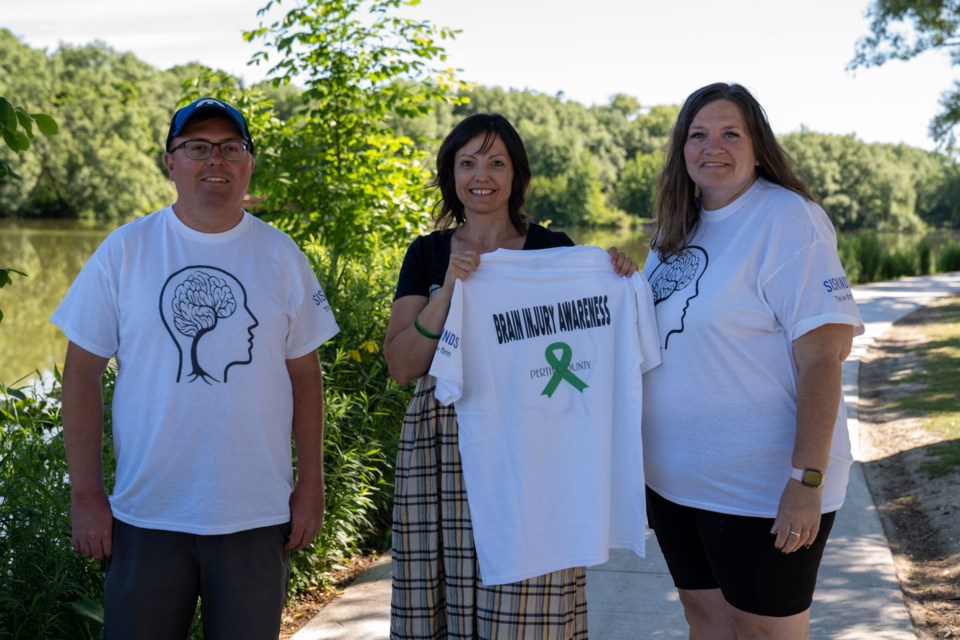A group of brain injury survivors and advocates are raising awareness and educating the community about supports available in Perth County amid Brain Injury Awareness Month.
The Perth Brain Injury Support Group Walk took place Saturday morning along the Avon River to honour brain injury survivors.The Perth Brain Injury Support Group – an offshoot of the Brain Injury Association of London and Region – meets monthly, with a leisure group meeting weekly.
“There’s a real need for the brain injury community to connect,” said Nicole Ferreira, the Perth County Brain Injury Support Group leader. “Connection is so important, and our community has really flourished. We have a really strong group.”
Established in 1982, the Brain Injury Association of London Region offers free support and social leisure groups to those in London, Middlesex, Oxford, Huron, Perth and West and Central Elgin. Programs are offered to both brain injury survivors as well as family members and caregivers.
Virtual support groups have also been recently added for those who are unable to travel or meet in person.
The association – made up of both community members and professionals – aims to improve the quality of life for those affected by traumatic brain injury through education, support, advocacy and increasing public awareness.
“Having that kind of support available to individuals suffering is so important for survivors and caregivers. Our support groups provide such a needed sense of community and belonging in a safe space,” said Stephanie McGill, the Brain Injury Association of London Region’s executive director. “The Perth County group in particular, they’ve been around for many, many years and have grown into a little family.”
The Perth-based support and leisure groups engage in community activities together, answer questions for new members, discuss their experiences and share resources.
“You make a lot of friends and help new people,” said Jon Carter, a brain injury survivor and co-facilitator of the Perth group.
“It’s good to be able to sit and talk with people that understand what is going on, and it’s also great to listen to someone else with a similar experience,” said fellow co-facilitator and brain injury survivor Brenda Dufton.
The Perth Brain Injury Support Group also offers a six-week multidisciplinary concussion education program, facilitated by professionals including occupational therapists, social workers and speech pathologists.
“There’s a strong focus on being able to apply the strategies learned in the program,” Ferreira explained.
She said it’s important for those who have suffered brain injuries to know resources and supports are available in the local area.
June marks Brain Injury Awareness Month, which has featured the national Shine a Light on Brain Injury campaign to increase awareness of the prevalence of brain injury among Canadians.
Traumatic brain injuries can be caused by blows, bumps or jolts to the head, often resulting from assault, falls, sports injuries or motor vehicle accidents. Acquired brain injuries can cause major changes to everyday life, including one’s independence, abilities, work, and relationships with family, friends and caregivers.
By 2031, traumatic brain injury is expected to be among the most common neurological conditions affecting Canadians, according to figures provided by the association.
Traumatic brain injury occurs at an annual rate of about 165,000 people per year – or nearly 456 people every day. That’s the equivalent of one Canadian injured every three minutes.
“This year, we are highlighting how mental health is affected by brain injury and how traditional supports aren’t always accessible to the brain injury community,” McGill said. “As a country, we need to recognize the inequitable treatment of those with disabilities (particularly invisible ones) and work to make sure that individuals with brain injury have access to mental health supports.”
Those who acquire a brain injury are at an increased risk of developing a diagnosable mental illness, McGill explained, often experiencing fundamental changes to their brain, self-identity and abilities. She said about 50 per cent of all people with traumatic brain injury are affected by depression in the first year post-injury.
Caregivers are also likely to experience mental health challenges, making caregiver support crucial as well.
Members of the Perth County Support Group said they hope to continue initiatives and efforts to increase brain injury awareness in the Stratford community.
“We would like to be able to support as many people as we can,” Dufton said. “Brain injury survivors need to know they are not alone.”



